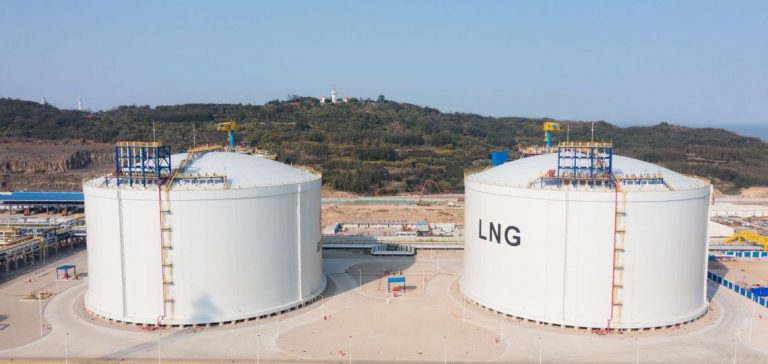Eastern Europe gains a strategic asset with the inauguration of the Alexandroupolis liquefied natural gas (LNG) terminal, located in northeastern Greece. This project, led by the Greek company **Gastrade**, aims to diversify gas supply routes for several Central and Eastern European countries. Connected to the Greek distribution network through a 28-kilometer pipeline, the terminal is designed to supply strategic markets, including Bulgaria, Romania, Serbia, and Ukraine, thereby enhancing the energy resilience of these regions.
A Key Infrastructure for the Region
The Alexandroupolis terminal consists of a floating storage unit permanently moored in the Thrace Sea. Its storage capacity, combined with its connectivity to the regional network, makes it a crucial entry point for LNG from the United States, Qatar, and Egypt. This terminal, developed over several years, aims to bypass Russian-dominated supply routes and secure gas access for landlocked Eastern European countries often exposed to geopolitical tensions.
This new infrastructure is part of a broader reorganization of European gas flows, aiming to reduce the region’s energy vulnerability. The LNG deliveries from Alexandroupolis can also be redirected to other countries in the region thanks to existing and future interconnections, including the Greece-Bulgaria pipeline project, operational since late 2022.
Strengthening Regional Interconnections
The terminal positions itself as a strategic lever to supply the energy markets of the Balkans and Central Europe. Bulgaria, which holds a 20% stake in Gastrade, has played a key role in promoting this project. In December 2023, a 170-kilometer pipeline between Bulgaria and Serbia was inaugurated to transport Azeri gas and is expected to eventually connect to the Alexandroupolis terminal, providing a new alternative to Russian supplies.
Additionally, Ukraine and Moldova, facing growing uncertainties over their gas imports, have already expressed interest in integrating with this new energy hub. The terminal could thus become a crucial entry point for gas destined for Eastern and Central European countries, strengthening the region’s energy independence.
A Geopolitical Pivot for Europe
The geopolitical significance of this terminal extends beyond the commercial scope. Turkey, also concerned about its energy dependence on Russia, is seeking to diversify its supply sources. A recent agreement signed between the national company **Botas** and **TotalEnergies** for LNG delivery over ten years illustrates this regional dynamic. Although this agreement is separate from the Greek initiative, it shows neighboring countries’ willingness to turn to new supply sources to better withstand potential energy crises.
For Greece, the opening of this infrastructure is an opportunity to strengthen its role as a natural gas hub in Southeastern Europe. With the completion of the terminal, the country positions itself as a central player in energy redistribution, attracting strategic partnerships while consolidating its place in the European energy landscape. This dynamic should also prompt other European countries to invest in similar infrastructures to protect against supply risks.
Toward Increased Energy Security
The commissioning of this terminal marks a significant advancement in the European Union’s energy security strategy. The EU has been seeking to diversify its gas sources since the 2014 Ukrainian crisis, but the war in Ukraine has accelerated this quest for independence. The Alexandroupolis terminal is designed to adapt to this new reality by providing a reliable alternative to Russian imports, while meeting the immediate needs of neighboring countries.
With this infrastructure, Europe now has an additional tool to redistribute gas to regions historically dependent on Russian supplies. This diversification will help stabilize prices and reduce risks associated with geopolitical tensions in the region.






















